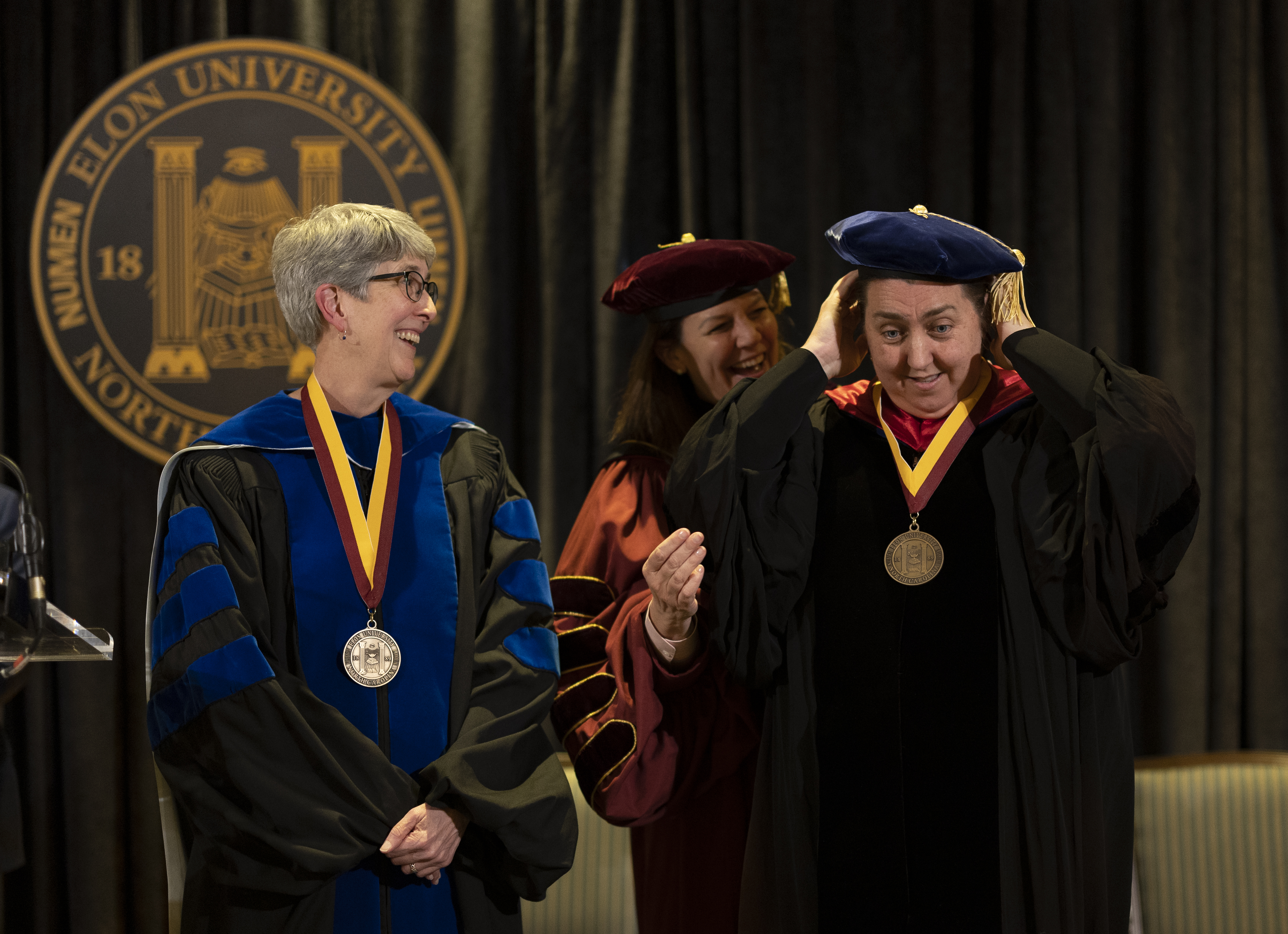Mary Jo Festle, Maude Sharpe Powell Professor of History, and Ann Cahill, professor of philosophy and director of the National and International Fellowships Office, were celebrated on Tuesday, Feb. 20, as Elon University’s seventh and eighth Distinguished University Professors.
Elon University has honored the scholarship, leadership, service and teaching of longtime faculty members Mary Jo Festle and Ann Cahill by investing them with the title of Distinguished University Professor during a formal ceremony on Tuesday, Feb. 20.
Dave Porter P’11 P’19, chair of the Elon University Board of Trustees, conferred the professorships on Festle, the Maude Sharpe Powell Professor of History, and Cahill, professor of philosophy and director of the National and International Fellowships Office. The Distinguished University Professorship is bestowed upon occasion to senior faculty members, honoring their teaching, scholarship, leadership and service to the Elon University community. The board of trustees created the professorship in 2001 and a faculty committee solicits nominations and recommends recipients of the honor to the president. The university announced in May that Festle and Cahill would become the seventh and eighth Distinguished University Professors.
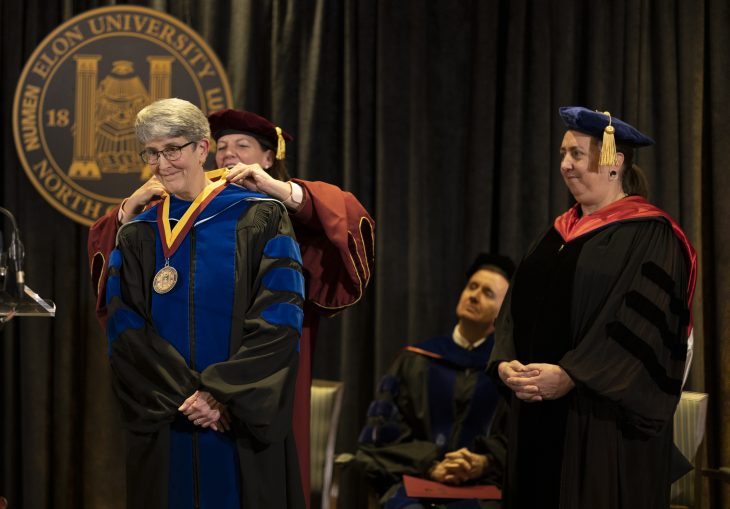
The formal ceremony in McKinnon Hall on Tuesday night provided an opportunity to highlight the impact that Festle and Cahill have had upon their fields, the university and countless students during their decades of service as members of the university’s faculty. During the ceremony, each shared what their time at Elon has meant to them personally and professionally and offered their thoughts about how higher education at Elon and more broadly continues to evolve. Sharing in the celebration on Tuesday night was a room full of family, friends, colleagues as well as current and former students who have been impacted by the knowledge, guidance and expertise Festle and Cahill have demonstrated across their time at Elon.
“You both are creative teachers and caring mentors, thoughtful and incisive scholars, wise leaders, and community members working to bring into being our shared vision for Elon,” President Connie Ledoux Book said at the event. “You both exemplify what is best about Elon University. As Distinguished University Professors, you will continue to inspire us to seek excellence.”
In an invocation, Professor Emeritus Anthony Weston said that to fully honor the accomplishments of Festle and Cahill, everyone can aspire to be “distinguished” in their own roles. “Let us take this moment of celebration to consider ourselves also, right now, already Distinguished University Persons, in this way at least: that we all seek to do what we do as well as we can, in our own special ways, truthfully to ourselves, maybe even discovering, by doing it, our own special gifts and offerings,” Weston said. “That’s distinction enough to start with.”
Mary Jo Festle
Festle has been a model for how to successfully integrate teaching, mentoring, scholarship and servant leadership. She arrived at Elon in 1993 and since then has served in leadership roles with multiple high-profile programs including as director of the Honors Program, associate director of the Center for the Advancement of Teaching and Learning and as coordinator of the Women’s, Gender & Sexualities Studies Program.
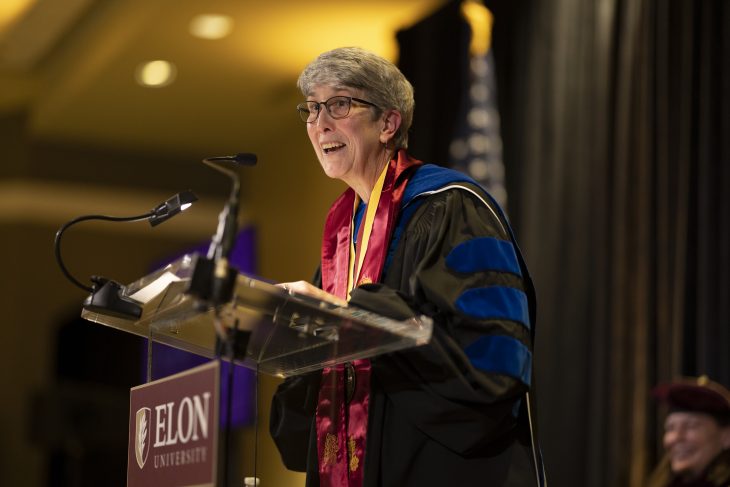
In his introduction of Festle, Associate Provost Peter Felten noted that when he asked colleagues about Festle, they noted that she “makes everyone and everything around her more welcoming, more thoughtful, more intentional, more inclusive — she is restless and relentless in her commitment to learning, equity and growth.”
In her remarks Tuesday night, Festle celebrated several of the Elon values and commitments she has been a part of during her time at the university, with insights into how she has come to understand them and the challenges the university faces as its community seeks to attain them.
As a faculty member, Festle said she has seen a commitment to “doing really challenging work, and doing it very well.” That’s been reflected in the recognitions Elon has received for the high quality of the education it delivers, its commitment to excellence in teaching and its dedication to being a well-run organization. During her tenure, Elon has met the challenges of moving from a college to a university and surviving with an endowment that is smaller than many of its peers all while implementing ambitious strategic plans, she said.
“We should be proud of those accomplishments and also ready to grapple with more challenges,” Festle said. “Within higher education, we must negotiate the implications of generative AI, attacks on programs related to diversity, equity and inclusion and skepticism about the value of a college degree. … I’m glad that we are thinking about big thorny issues and now giving more attention to our health and well-being.”
As an institution, Elon has made a commitment to putting and keeping student learning at the center of what the faculty do. As a new faculty member, she recalled, she saw faculty educating one another and she learned from her peers how much learning can happen outside of class time. She saw how more faculty began analyzing teaching in a systematic manner to better account for the lived experiences that students bring with them into the classroom as they learn new disciplines. “Every semester, I worry about how to design a course and environment that engages all these different individuals,” Festle said.
Within the field of history, faculty face the challenge of teaching about events and periods during which different people could have such drastically different experiences. Now, Festle noted that she sees efforts from states and school systems to legislate what should and should not be included in classes and textbooks. “Students can handle being exposed to complex truths,” Festle said. “The American past included injustices, hypocrisy, mistakes, and suffering. It also included joys, flourishing communities, idealistic principles, and courageous efforts to achieve them. I think instructors should offer students complicated facts and let them make up their own minds about what they think about those facts.”
Festle also lifted up a commitment to community at Elon, pointing to the ways it can be fostered around the office mailbox, at College Coffee or standing in line during Commencement. Festle notes that she has seen the community at Elon grow and evolve during the past three decades, with some changes coming more slowly than she would have preferred but that she has continued to see more awareness of different types of diversity and more discussion of inclusion and equity.
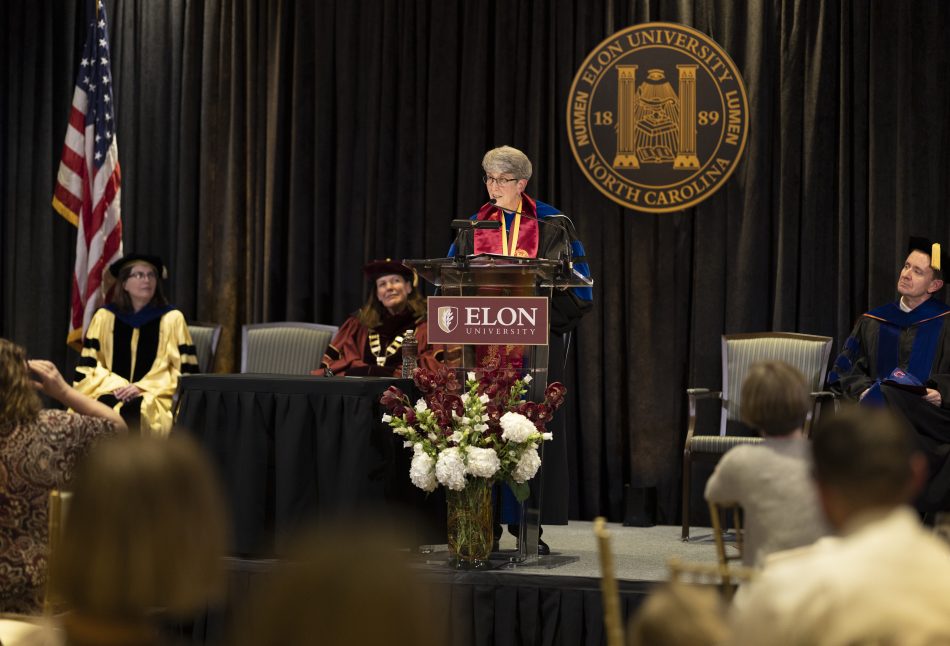
“Our mission statement calls for respect for human differences, but authentic community requires a lot more than respect,” Festle said. “It requires seeking to understand others’ experiences and perspectives and honestly examining ourselves. It requires intentional efforts to ensure that every individual is welcomed, included, supported, treated fairly, and feels like they matter.”
That community relies upon interdependence, Festle said as she pointed to multiple examples when people from across the campus have joined together in service to students and to the university. In her role as part of the leadership team of the Center for the Advancement of Teaching and Learning, Festle said, she learned even more about the benefits of interdependence.
“CATL is a place where faculty ask questions and discuss more than they make assertions, a place where they honestly share both their successes and struggles, and where they generously listen to one another and offer feedback,” Festle said. “I experienced an ethos of mutual support — a sense of being together in this important endeavor of teaching and learning — and I watched it almost magically spark innovation and growth.”
Finally, Festle turned to hope, quoting Czech leader Vaclav Havel who in his book “Disturbing the Peace” posited that hope is “not the conviction that something will turn out well, but the certainty that something makes sense, regardless of how it turns out.”
“I believe the willingness to take on challenging work, to make students’ learning our priority and to build an inclusive community — all those things show our collective orientation toward hope,” she said. “Thank you for helping me and one another sustain this hope.”
Ann Cahill
Cahill, who joined the Elon faculty in 1998, is widely recognized as a prolific and influential teacher, scholar and mentor and as a strong voice on challenging issues that face our society. She has a strong record of service to the university and has supported the academic and personal journeys of countless students — in her classes, as a research mentor, as the director of the Lumen Prize and now as director of the Office of National and International Fellowships.
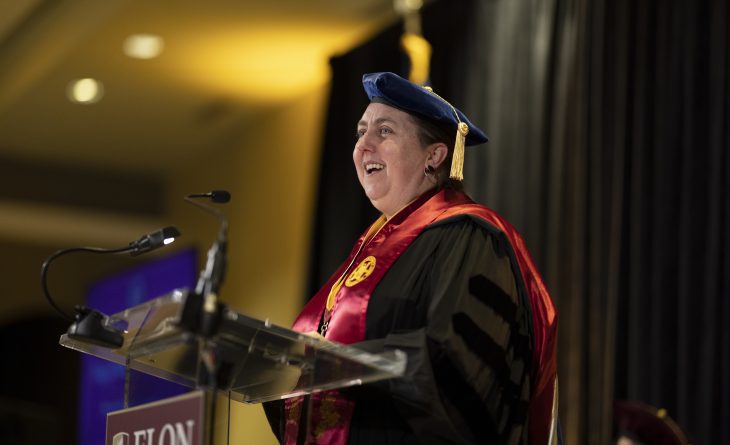
In his introduction of Cahill, Professor Stephen Bloch-Schulman said he struggled to find someone to say “one good word” about Cahill because once everyone starts talking about her as a colleague, mentor, scholar and advocate can’t stop at just one good thing to share about her. “First and foremost, it is because of what an excellent partner she is, in the deepest and most generous sense,” Bloch-Schulman said. “She never lets a good deed or a good idea go forgotten, even decades later. She has, as far as I can tell, absolutely no ego. It is all about the goal that she is dedicated to and she insists, always on, standing side by side with others as we look together to the goal and keep that goal singularly in mind.”
Cahill told those gathered that being honored by Elon as a Distinguished University Professor opens a “floodgate of memories” of her time at Elon and a path in life that has allowed her to achieve her dream of being a philosophy professor at an institution “where my passions for scholarship and for teaching were not seen at odds with each other” and where she could find opportunities to put her skills and expertise to work on behalf of the university community.
“Not a single element of this list – the opportunity to read and write for a living, the ability to take teaching seriously while being surrounded by people who could help me get better at it, and the chance to have an impact on a rapidly growing and changing institution of higher learning – none of those could be taken for granted,” Cahill said.
Along with recounting formative experiences at Elon with students and colleagues, Cahill also turned the audience’s focus to what she said is the “all too real threat that our democracy is lurching toward authoritarianism.” Cahill said that in response to that threat, she offers up the idea of the worth of alterity, which she noted is another term for other-ness. In many cases, alterity or other-ness is seen by some as a problem, but Cahill argued that a recognition of the worth of alterity is essential to preserving democracy and staving off authoritarianism.
“I am arguing that a failure to understand the essential role that
alterity plays in both ethics and democracy is dangerous, and that we should
become attuned to the kinds of alterity that safeguard our humanity and our
democracy, and work to protect them,” Cahill said. “It is those kinds of alterity, in my view, that are currently being threatened.”
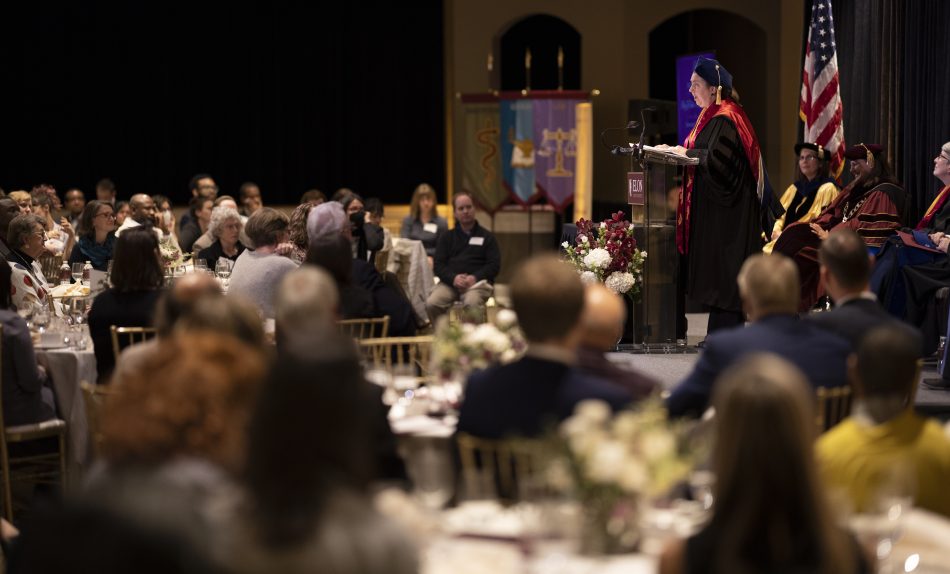
The value of alterity is being threatened by what Cahill notes is the “increasingly common vilification of expertise, with more and more experts in their fields being considered suspicious just by virtue of the knowledge and expertise they possess. “Those who are attempting to ban books, criminalize the study of disinformation,
and prohibit medical care professionals from providing gender-affirming care are
trying to destroy the alterity at the heart of expertise,” Cahill said. “By explicitly claiming that the value of any knowledge or field of study can only be measured by the degree to which it aligns with a single worldview, they seek to make the inequalities that they want to perpetrate difficult to perceive.”
By embracing alterity, we can as individuals and as a society reiterate that we are “capable of being moved by that which is beyond us,” Cahill said. We should continue to be inspired by logic and ethics that are sound, well-grounded and relevant. We should remain open to change while carefully evaluating our influences, she said.
“Alterity — that there is art that can make us gasp involuntarily, that there are people with radically different experiences from our own, that there are forces of nature that are not controllable by sheer human will, that we, in fact, are not the measure of all things, alterity is both the engine of and demand for the human act of meaningmaking,” Cahill said.
Cahill closed by turning to a single line of lyrics from a song by local singer-songwriter and Elon alumna Molly McGinn ’96 — “We can be wild and kind, if we try.” In those nine words, Cahill said, McGinn has encapsulated the work we have to do collectively to challenge existing structures, but to do them in a way that is kind. “Kindness needs wildness as much as wildness needs kindness, for kindness untethered from a love of justice and possibility risks providing comfort to oppressors,” Cahill said.
By closing with the words, “if we try,” McGinn is challenging the listener to make the effort, as a community, Cahill noted.
“Questions still remain,” Cahill said. “Are wildness and kindness enough? Do we need a third force here — humility, maybe? Integrity? Wonder? I don’t know. I’m going to think about it some more. Maybe you will, too. Maybe if my extraordinary streak of luck holds, we’ll get to think about it together.”



